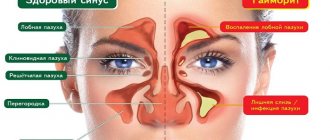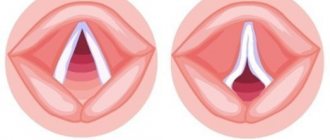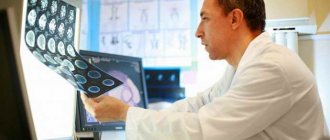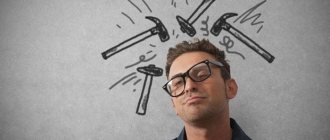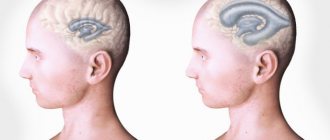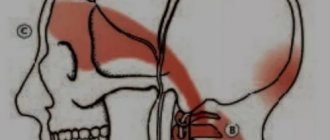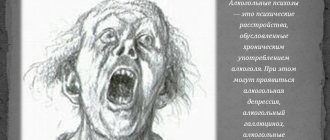In short: In fact, a bad mood from a hangover is not depression. Antidepressants won't help. With a hangover, everything that can lift your mood without harm to the body is recommended. Valerian or motherwort will relieve anxiety.
- What is depression
- Why does a hangover make you feel bad?
- How to treat depression with a hangover
- How to treat anxiety and irritability after binge drinking
- Are antidepressants and alcohol compatible?
- Do antidepressants help with hangovers?
- Can alcohol help with depression?
Hangover symptoms and causes of their occurrence
To combat depression, anxiety and restlessness that occurs after drinking alcohol, it is necessary to understand the causes of hangover symptoms.
Hangover symptoms appear when poisoned by alcohol-containing drinks. In this way, the body reacts to general intoxication and tries to cope with the problem. Why hangovers cause depression and anxiety can be understood by examining the following symptoms:
- headache;
- nausea, often ending in vomiting;
- trembling of limbs;
- increased heart rate;
- changes in blood pressure;
- chills followed by fever;
- Unconscious fear manifests itself more strongly;
- anxiety;
- disorientation in space;
- depressive disorders;
- panic.
When depression, anxiety, or panic occurs during a hangover, this indicates a mental health disorder. The cause of hangover symptoms of a psychological nature is the effect of alcohol on the nervous system. Alcohol breakdown products are excreted mainly through the liver and kidneys. But the liver does not always cope with its task, especially if the amount of alcohol entering the body is too large. This is why a hangover occurs.
When alcohol enters the bloodstream, the nervous system receives an exciting impulse that inhibits brain function. As a result, the mood changes, anxiety is felt, and the anxious feeling does not go away. The listed symptoms do not disappear even after sobering up and progress to depression.
Let's take a closer look at how some hangover symptoms of a psychological nature manifest themselves, and figure out how to eliminate them.
Depressive states with a hangover
Depression from a hangover is manifested by painful experiences combined with incredible melancholy. The causes of depression that occurs after a hangover the next day are the following:
- the level of glucose in the blood sharply decreases, which causes muscle spasms and a general loss of strength;
- when alcohol enters the bloodstream, the nerve fibers first experience excitement, then a sharp inhibition occurs, which causes an uncomfortable state;
- with alcohol intoxication, there is no sober assessment of what is happening;
- redness of the skin from drinking alcohol;
- appetite disorders;
- changes in blood pressure;
- headaches after drinking;
- swelling of the face and limbs after drinking alcohol;
- feeling of heaviness in the stomach;
- desire to drink.
In severe conditions, in this case, clouding of consciousness occurs, accompanied by hallucinations, helplessness, and simultaneous psychological arousal. This is how panic develops after drinking alcohol.
Methods for eliminating anxiety and fear
To eliminate the feeling of anxiety from a hangover, you can follow these recommendations:
- you need to drink a lot. Plain still water, freshly brewed green tea combined with honey, herbal infusions of chamomile and mint. The minimum amount of liquid should be about 4 liters. This way the blood will be purified a little faster and better cleared of toxic substances;
- the body needs support, so you can take vitamin C, preferably in effervescent form, so as not to harm an already irritated stomach;
- you can take an anti-hangover pill after studying the contraindications;
- To quickly come to your senses, you can stand under a contrast shower.
Using the tips listed above and helping the body cleanse itself of toxic substances, you will be able to get rid of an uncomfortable psychological state.
You should draw the right conclusions from the situation and not drink alcohol in large quantities. Using the proposed methods for cleansing the body of alcohol breakdown products, you need to tune in to a positive way out of the situation. After all, intoxication could have ended even worse, for example, in hospitalization.
You can study popular articles by going to a thematic site, where there is a lot of material on issues of interest, where means of dealing with a psychological problem are described, and doctors share recommendations, and where you can make friends by receiving the necessary comments.
Almost every person has experienced a feeling of anxiety, causeless anxiety, sometimes turning into depression. One of the reasons for this condition is excessive amounts of alcohol. Let's figure out why depression and anxiety occur with a hangover, and consider methods of dealing with the uncomfortable state.
When alcohol enters the bloodstream, the nervous system receives an exciting impulse that inhibits brain function. As a result, the mood changes, anxiety is felt, and the anxious feeling does not go away. The listed symptoms do not disappear even after sobering up and progress to depression.
How is alcoholic depression treated after binge drinking?
It will take longer to get rid of depression after a long binge than after a one-time binge. Try not to drink alcohol for a couple of months - and psychological problems should go away. If your mood continues to be bad without any objective reasons, consult a doctor. Don’t be shy, now there are many drug treatment centers where you can be observed anonymously, and advanced depression will bring you much more unpleasant moments than going to the doctor.
Among the medications that will help cope with depression after binge drinking are: glycine, afobazole, finlepsin (carbamazepine), Grandaxin or Mebicar. The doctor may also prescribe a modern antidepressant. Don't be afraid to take them: they are practically harmless, have few side effects and no, they are not addictive.
To restore the nervous system after a binge, it is recommended to take a course of any multivitamins - the main thing is that they contain vitamins B1, B6 and C. Alternatively, you can take sports vitamins: for example, Animal Pak from Universal Nutrition.
They contain essential vitamins in shock doses, microelements, enzymes and adaptogens (ginseng). Subscribe to our YouTube channel!
How to get rid of anxiety and worry from a hangover
1. The first thing you need to do is stop drinking alcohol.
We recommend reading: Is there an allergy to sugar in adults and children and how does it manifest itself?
2. Detoxify the body and cleanse the blood of ethanol breakdown products. Important! The use of sorbents in this case is an ineffective measure, since they will only cleanse the intestines. The patient will need a drip with antioxidants and hypatoprotectors, which improves liver function .
3. Restore water balance, saturate the body with oxygen and vitamins.
4. Get a good night's sleep. This is facilitated by taking sleeping pills and sedatives prescribed by the doctor .
As the body gets rid of toxins, the patient’s psycho-emotional and physical condition will improve. But in the case of subsequent consumption of alcoholic beverages, the symptoms will not only resume, but will also increase rapidly.
If a person experiences feelings of fear, anxiety or panic attacks while drinking alcohol, this is a clear indicator that he is developing alcoholism , which needs to be treated.
Seek help from a doctor to prescribe medication and choose an effective coding method.
Some useful tips
Finally, a few of the most basic recommendations that need to be taken into account when drinking alcohol. I will deliberately refrain from describing exotic measures that should be taken a day or even two before drinking alcohol, because in practice it is unlikely that anyone will use them, and their effect is rather more theoretical. Instead, let's focus on the basics and the simplest at the same time.
Firstly, 3 - 5 hours before the celebration with heavy libations, you should take the so-called booster dose: 50 ml of vodka. This is enough for the liver to start producing the necessary enzymes in advance, and then by the time you start taking the main doses, it will already be well prepared for detoxification.
Secondly, immediately before the feast, drink activated carbon at the rate of 0.2 grams per 10 kilograms of body weight. Or another sorbent. Most of the toxins will soon end up in the intestines, where the simultaneous presence of substances that absorb them will be very appropriate.
Thirdly, never drink different alcoholic drinks during the same feast. By combining alcohol, we make it difficult for the liver to neutralize alcohol. If you really want to get drunk, then this can only be done with pure vodka. Any other drinks are intended to provide taste pleasures and light mood lifting in small doses. Getting drunk on cognac or wine is a very bad idea.
Fourth, eat and drink properly. Feel free to wash down your vodka with water; drink water little by little throughout the feast. And remember that a large and especially fatty snack does not neutralize, but only delays the effect of alcohol. For which retribution will certainly follow in the form of a severe hangover. Therefore, snack in moderation, preferring fruits, especially grapes and apples. Then you will feel intoxicated with a smaller dose of alcohol and, accordingly, will save yourself from additional torment in the morning.
Why does a hangover cause restlessness and anxiety?
At the initial stages of drinking alcohol, a person experiences an improvement in mood and a surge of energy from alcohol. But these emotions are short-lived. With experience of alcohol dependence , drinking alcohol leads to increased negative symptoms and manifests itself in the following:
· Increased blood pressure.
Along with the above symptoms, a feeling of fear arises, which can develop into depression, panic attacks and hallucinations ( delirium tremens) .
The worsening of symptoms is due to the toxic effects of alcohol on the entire human body and in particular on the central nervous system.
Data
· A person can feel severe anxiety and fear either immediately after drinking a large dose of alcohol or several days after the last drink.
· Anxiety, fear, anxiety, and panic often occur in an addicted person due to the abolition of alcohol consumption.
· Anxiety leads to insomnia, which aggravates the patient’s psycho-emotional state and, without receiving professional help, provokes an increase in the dose of alcohol consumed.
· Against the background of panic and lack of sleep, the risk of epileptic seizures .
Can alcohol help with depression?
It turns out that moderate alcohol consumption is itself an antidepressant. In 2013, a study was completed in Spain in which 5,500 volunteers took part. The results showed that drinking 5 to 15 grams of pure alcohol per day reduced the risk of depression. The best results were among those who drank wine in quantities of 2 to 7 glasses (150 ml) per week.
However, those who drank more than this, on the contrary, had a much higher risk of developing depression than abstainers.
To reduce anxiety and irritability, you can take one of the mild herbal sedatives: valerian (in any form), motherwort (in any form), sedative herbal infusions from the pharmacy. For a wider list of sedatives that toxicologists recommend for a hangover, read the article “How to fall asleep with a hangover”: from it you will also learn which sedatives are prohibited for a hangover and why hangover insomnia should not be tolerated at all.
Article published: 2019-01-01
This article was last updated: 02/28/2020
Didn't find what you were looking for?
Try using search
doctor or administrator.
Read the dictionary of terms.
Physiological reasons
Poisoning with alcohol products provokes a number of negative consequences in the body.
1. Insufficient production of serotonin. A decrease in its concentration negatively affects mood and provokes fear, anxiety, and panic.
2. Hyperactivity of the nervous system. Overexcitation leads to sleep disturbances, tremors , irritation, followed by loss of strength and emotional exhaustion.
3. Changes in blood glucose levels. Alcohol abuse causes a spike in blood sugar, which can lead to confusion, disorientation, lack of coordination and, as a result, panic and a feeling of fear.
4. Dehydration. It is aggravated by diarrhea and vomiting from a hangover. The brain reacts especially acutely to dehydration. Due to insufficient nutrition of the organ cells, dizziness, weakness, anxious thoughts and attacks of fear occur.
5. Arrhythmia. Changes in heart rate and blood pressure cause anxiety, which can develop into panic.
6. Intoxication of the nervous system. This condition leads to the fact that the patient begins to beat himself up, is afraid to be alone and behaves aggressively.
2. How to properly treat blood pressure from a hangover and can you do it yourself.
Often people who have the habit of drinking are depressed in the morning. Excessive alcohol consumption causes changes in psychological state, which explains why hangovers cause depression and anxiety in almost everyone. The condition is manifested by apathy, depression, guilt; regular excess of alcohol can eventually cause mental illness.
Psychological reasons
The reasons for depression in the morning may be a feeling of guilt, which is caused by actions that were committed the previous evening. This causes nervous shock. During alcohol intoxication, a person's self-criticism decreases. In such a state, you can do things that you would not do in a sober state. When evaluating behavior, shame and remorse later appear.
During severe alcohol intoxication, memory loss may occur. When a person cannot remember what happened, he becomes afraid because he is not sure whether he did anything unpleasant.
The concept of a hangover and its symptoms
Regular and heavy consumption of alcoholic beverages provokes a hangover. It is a reaction to poisoning by the breakdown products of ethyl alcohol, which actively spread throughout the body.
Alcohol does not fully provide the expected relaxation effect and does not allow you to disconnect from reality for a long time, and a hangover brings unpleasant sensations.
Externally, a hangover is manifested by health problems:
- severe headaches,
- painful sensations in the liver,
- increase or decrease in blood pressure,
- heart problems, palpitations,
- trembling hands,
- nausea, vomiting,
- changeable states of fever and chills.
The nervous system is also put to the test when drinking, and you can develop mental disorders. Among them are:
- depression,
- outbursts of unmotivated rage towards others,
- rapid changes in mood: from apathy and indifference to increased excitability,
- a constant feeling of guilt, fear, anxiety, which comes later and covers the drinker headlong,
- loss of orientation in space, the person is practically unconscious.
These symptoms may appear all at once or separately. They are less pronounced if a hangover is a rare occurrence due to infrequent alcohol abuse. If the process has gone far, then the person may lose control of himself, and death is possible - suicide.
The opposite situation is also likely - fear of death: a person ceases to feel protected, is afraid of everything, experiences anxiety over trifles, believing that they will lead to his death.
Depression after a hangover
Depression is a mental personality disorder. It arises as a reaction to various negative events from the outside. You should separate depression from just a bad mood, which sooner or later can disappear without visible effort.
Depression does not go away so quickly; it often requires consultation with a competent specialist and the appointment of appropriate treatment. The same term began to be used to refer to certain states after severe intoxication, these include:
- insomnia,
- vague melancholy
- discomfort,
- guilt,
- causeless fear.
Depression manifests itself differently in people with different temperaments: some behave quietly and avoid contact with others. Others try to actively communicate with everyone, but do not receive the proper response, which further aggravates their anxious state.
The cause of alcoholic depression is a disruption in the production of neurotransmitters, including serotonin, the hormone of pleasure. They don’t enter the blood, the person doesn’t like anything.
Mental effects of a hangover
The effects of drinking alcohol do not last long. Then comes a hangover, during which the drinker begins to feel that the problems and troubles that he tried to get rid of by pouring the treasured liquid into himself have not disappeared.
Their presence is only more clearly indicated when the first euphoria wears off. It is replaced by a feeling of fear and anxiety from a hangover; an anxious state can become a constant companion of a person. It is more difficult to solve life's problems in this state, since there is less physical and mental strength.
Waking up after serious intoxication, a person experiences a feeling of fear from a hangover. Anxiety becomes his constant companion. This can be explained simply: in an inadequate state, he did all sorts of stupid things.
What's going on and how to help
Panic attacks after alcohol occur in those people who try to “drown” their experiences, fears, and problems with alcoholic beverages. The next morning, such people may have temporary memory lapses. After a short period of time, the whole picture of the previous evening is restored, and the person is “gnawed by conscience” for indecent behavior, for innocent flirting, for loosening his tongue and revealing secrets.
We recommend reading: Glycerin suppositories for hemorrhoids: reviews and instructions for use
In a sane state, a person begins to analyze his behavior, which causes a feeling of anxiety and remorse. If you do not free yourself from obsessive thoughts and self-flagellation in time, then panic attacks are inevitable. The best way is to completely relax and not worry. If the feeling of fear and anxiety from a hangover persists for a long time, then you will need to consult a psychotherapist for qualified help.
In the case where alcohol has become a cure for prolonged depression, the first thing you need to do is help the body get rid of intoxication. To do this, take a contrast shower and drink plenty of fluids. You cannot treat a hangover with alcohol, as this will only worsen the situation and the person’s condition. The best option would be chamomile tea or mineral water without gases. If the feeling of nausea and headache does not disappear for a long time, then you can resort to gastric and intestinal lavage.
After this, you need to completely distract yourself from the obsessive fear. You can watch a funny movie, meet with friends or loved ones. You shouldn’t reproach yourself for problems, ask “why”, you need to accept that everyone has the right to make a mistake that will not be repeated in the future.
The nervous system is depressed by alcohol
Poisoning affects the nervous system. After excitement and intoxication, a sharp decline occurs, a decrease in mood, and emotional exhaustion. It is then that fear, anxiety, panic attacks, guilt, memory loss, hallucinations, and a feeling of imminent death appear.
It's hard to remember what happened the day before - what if something bad happened? What if something irreparable and shameful was done? After all, a drunk often does not control himself and commits actions without understanding their consequences. Trying to remember what you did only increases anxiety and panic.
Remember: you can’t do anything other than get yourself in order right now. There is no need to try to talk to people related to your anxiety. There is no need to try to fix anything. The bulk of disturbing thoughts will go away as soon as your condition improves. Now panic attacks are a consequence of problems in the body, most of them will turn out to be illusory. So take your time, help yourself first.
Feelings of anxiety and fear: psychological aspect
A person's mental state plays an important role in alcohol poisoning. Poor health increases depression during a hangover. If a person is depressed or upset while drinking alcohol, a panic attack or excessive aggression may occur. Psychological discomfort occurs due to a number of reasons:
- avoiding difficulties with the help of alcohol;
- partial amnesia from a hangover;
- remorse due to a person’s behavior while intoxicated.
Anxiety manifests itself as tremors and restlessness. At this moment, a person feels anxiety and guilt, and may not believe what is happening.
Are antidepressants and alcohol compatible?
If you already have depression (not from a hangover, but due to a health condition), if your doctor has prescribed a course of antidepressants, then alcohol is prohibited for you until the end of the course of treatment. Almost all antidepressants are categorically incompatible with alcohol. Open the instructions for use of your antidepressant and read the list of dangerous side effects - in the presence of alcohol, the possibility of these side effects increases several times.
It is permissible to drink alcohol in hangover-free doses (a glass of vodka or cognac once a week) only while taking antidepressants based on ademetionine and St. John's wort.
Read a separate article for a detailed explanation of why you should not drink alcohol at all while taking other antidepressants. Subscribe to our YouTube channel!

